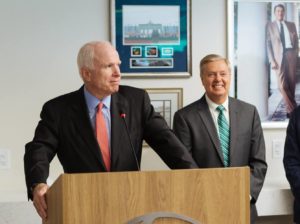 The next U.S. administration should embrace traditional democratic values and apply them at home and abroad, the Center for American Progress concludes in a new analysis released Thursday, The Washington Post’s Anne Gearan reports:
The next U.S. administration should embrace traditional democratic values and apply them at home and abroad, the Center for American Progress concludes in a new analysis released Thursday, The Washington Post’s Anne Gearan reports:
The report, which was obtained by The Washington Post, lays out nonpartisan prescriptions but is clearly aimed at giving Democrats talking points to promote and defend a traditional foreign-policy approach based on strengthening democracy and projection of American values. The report recommends that the United States adopt “policies to help vulnerable democracies, including our own, to resist authoritarian influence and strengthen a growing global democratic community.”
The United States should continue to promote basic values such as free elections, an independent judiciary and freedom of expression around the world even though “its own democracy is in trouble,” says the report. Securing a Democratic World: The Case for a Democratic Values-Based U.S. Foreign Policy.
 Although its authors include politically liberal alumni of the Obama administration, the report embraces a defense of democratic values and the projection of democracy abroad often associated with Republicans, including the late senator John McCain (Ariz.), the Post adds.
Although its authors include politically liberal alumni of the Obama administration, the report embraces a defense of democratic values and the projection of democracy abroad often associated with Republicans, including the late senator John McCain (Ariz.), the Post adds.
Those who paid tribute to McCain during the service and in other ceremonies during the past week consistently cited his stand against autocrats, dictators, and demagogues, notes David J. Kramer, senior fellow in Florida International University’s Vaclav Havel Program on Human Rights and Diplomacy, a former Assistant Secretary of State for Democracy, Human Rights, and Labor, and former senior director at the McCain Institute for International Leadership.

McCain’s choice of the courageous Russian activist Vladimir Kara-Murza, who miraculously survived two poisoning episodes in Russia, to serve as a pallbearer was a clear parting shot at a favorite McCain target of scorn, Vladimir Putin. From Burma to Belarus, Egypt to Venezuela, countless others have been boosted by McCain’s concern for their welfare, his willingness to call leaders out for their abuses, and his support for universal human rights, democracy and freedom, he writes for The American Interest.
At the heart of such an effort should be a realignment of American foreign policy to meet the challenge posed by resurgent illiberalism….by forging stronger cooperation among democratic states, including in the defense of democracies under assault and the expansion of the global democratic space, the report adds, proposing the following steps:
- Restore democratic values and norms at home.
- Work with democratic allies to design and implement a counter-authoritarian playbook to push back against the encroachment on and abuse of the open systems of democratic states.
- Build stronger international networks of democracies to create a global democratic bulwark.
- Privilege U.S. relationships with democracies, and reflect this in U.S. policy decisions and spending.
- Strengthen international support mechanisms for populations nonviolently mobilizing for democracy around the world, while more systematically pressuring countries to uphold human rights and adhere to international law.
Increase funding for bipartisan democracy organizations
 To amplify impact, the United States should ensure that all tools of democracy promotion abroad are running at full speed and able to operate with maximum effectiveness, the report adds. Congress should accordingly expand funding for the National Endowment for Democracy, the National Democratic Institute, and the International Republican Institute, all of which invest in and work to strengthen democracy worldwide.
To amplify impact, the United States should ensure that all tools of democracy promotion abroad are running at full speed and able to operate with maximum effectiveness, the report adds. Congress should accordingly expand funding for the National Endowment for Democracy, the National Democratic Institute, and the International Republican Institute, all of which invest in and work to strengthen democracy worldwide.
Supporting democracy is sometimes misunderstood by the political left and right, said NDI president Derek Mitchell.
“It’s important to who we are but also very important to our interests. It should not be mistaken for the way it was done in Iraq or equated to the way Russia has been doing things of late,” Mitchell told the Post. “We are providing transparent assistance rather than shadowy subversion, which is what the Russians are doing. We are there when we are invited, and acting in good faith in helping people make their own decisions.”
 The CAP report acknowledges liberal skepticism and notes that democracy promotion may seem less of a priority for liberals than addressing economic inequality or other domestic issues, the Post adds.
The CAP report acknowledges liberal skepticism and notes that democracy promotion may seem less of a priority for liberals than addressing economic inequality or other domestic issues, the Post adds.
Progressives often lean toward a more “exemplarist” approach to forwarding democratic values, argues Daniel Nexon, an Associate Professor of Government and Foreign Service at Georgetown University. The idea, as Jonathan Monten notes, that “The United States exerts influence on the world through the force of its example” and that “an activist foreign policy may even corrupt liberal practices at home.”
Progressives see an important role for human rights in United States foreign policy, but believe that, on balance, Washington should use nonmilitary instruments to advance democratic pluralism, the rule of law, accountability, and transparency, he writes for Foreign Affairs.







